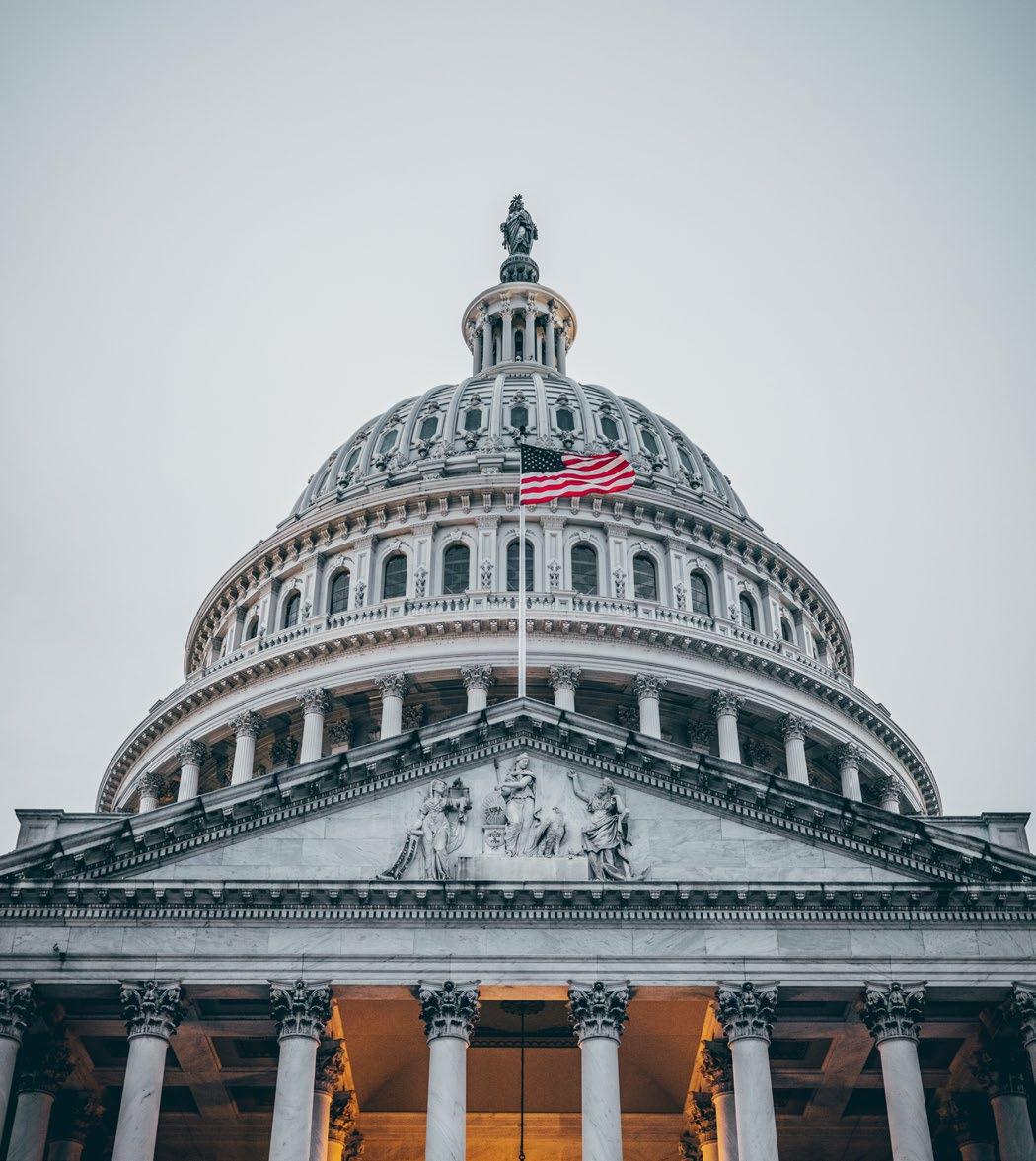
8 minute read
Looking Ahead to the Next Round of Federal Tax Legislation Considerations
CONSIDERATIONS FOR ALABAMA BUSINESSES AND INDIVIDUALS
KAREN R. MILLER, CULVERHOUSE SCHOOL OF ACCOUNTANCY, UNIVERSITY OF ALABAMA
Now that Alabama CPAs have received the critical guidance related to Alabama’s conformity with the federal relief provisions contained in the CARES Act and the Consolidated Appropriations Act, we turn our attention to the next two rounds of federal legislation which could potentially be proposed and/or enacted in 2021. In contrast to the situation that we faced in 2017 after the last change in the presidency, certain Alabama taxpayers could see a potentially significant increase in their federal tax liability, while others could see additional tax benefits resulting from enhanced credits and other provisions designed to assist American families who continue to face hardships as a result of the pandemic. For the state, the impact of Alabama’s inverted relationship with the federal income tax, which is attributable to Alabama’s allowance of a federal income tax deduction, will create significant challenges for legislators as they face potential declines in both corporate and individual tax revenue.
What to Watch in the First Round of Legislation – American Rescue Plan Considerations
Impact for Individuals
Soon after his inauguration, President Biden announced the details of the first component of his economic recovery plan, which is titled the “American Rescue Plan.” While the inclusion of an additional round of federal stimulus payments has received most of the media attention for the past four weeks, there are several additional individual tax provisions which could result in lower federal tax liabilities for a large percentage of American taxpayers, including:
• Increased child tax credits, with the possibility of a monthly payment option;
• Increased dependent care tax credits; and
• Increased earned income tax credits.
At the time this article was published, Congressional leaders were continuing to negotiate the eligibility criteria for the increased credits, and uncertainty still exists regarding the adjusted gross income (“AGI”) levels which will be used to determine eligibility. As a result, the number of potential Alabama households which could benefit from a lower federal income tax liability in 2021 is still uncertain, but the early indications from the Congressional negotiations point to a fairly high number.
While most Americans will be able to fully benefit from the additional household tax savings which will result from these increased credits, Alabama taxpayers will need to be mindful of the inverted impact for their Alabama income tax returns. As their federal income tax liability declines, so too will the amount of the federal income tax deduction which they are currently reporting in the calculation of their Alabama income tax liability. In 2018, when we last saw significant decreases in the federal income tax liability for many individuals as a result of the Tax Cuts and Jobs Act (“TCJA”) provisions, this increased Alabama tax liability caught many Alabama citizens by surprise and resulted in an unexpected tax burden which many individuals were not prepared to pay.
As noted above, one of the key elements of the American Rescue Plan will be an additional round of stimulus payments to American households. From an Alabama standpoint, these payments will be excluded from the calculation of Alabama gross income as a result of the provisions in recently enacted Act 2021-1, which included an exclusion for any stimulus payments which may be made in 2021.
Impact for Businesses
For Alabama businesses, it will be important to watch the negotiations related to a potential return of the mandate for payments of sick and family leave to employees. In the initial press releases concerning the American Rescue Plan, President Biden outlined a potential extension of the mandate through September 2021 and a possible removal of the original exemptions for businesses with less than 50 employees and more than 500 employees. The removal of these exemptions could be an unwelcome surprise for many small businesses which did not have to comply with the provisions in 2020. The associated payroll tax credit for the paid sick and family leave may also be extended, but it is possible that only employers with less than 500 employees may be eligible.
What to Watch in the Second Round of Legislation – “Build Back Better Recovery Plan”
Impact for Individuals
During the campaign, President Biden was outspoken about his plans to raise the tax rates for Americans with annual income in excess of $400,000. Proposals specifically referenced by his campaign include the following:

• Restoring the top tax rate for individuals to the pre-TCJA level of 39.6%;
• Taxing the qualified dividends and long-term capital gains of individuals with income in excess of $1 million at the ordinary tax rates (which would be restored to 39.6% for those in the top bracket);
• Limiting the benefit of itemized deductions for individuals with income in excess of $400,000 by imposing a cap on the tax benefit at a 28% rate;
• Removing or modifying the existing
Social Security wage cap to tax earnings in excess of $400,000; and
• Taxing unrealized capital gains in excess of $100,000 at death or the time of gift.
A potential decrease in the exemption levels for the estate and gift tax was mentioned in earlier campaign discussions, but it is unclear whether President Biden would favor a return to the pre-TCJA exemption levels, which were approximately $5 million, or instead a return to the 2009 exemption levels, which were $3.5 million for the estate and generation skipping tax and $1 million for the gift tax.
Based on the current projections of the percentage of American taxpayers who would potentially be impacted by these proposals, approximately 30,000 Alabama individual taxpayers could see a significant increase in their federal tax liability if the proposals are enacted. Many Congressional leaders continue to discuss a 2022 effective date for these provisions, which potentially could provide these Alabama taxpayers with a few months to consider tax planning opportunities which could minimize the tax burden of the new proposals. Strategies to consider include those which would potentially accelerate the timing of both itemized deductions and income recognition in 2021 and those which would accelerate the transfer of capital assets which have significant unrealized gains.
These proposals will also create significant budget issues for the state, as the inverted relationship between Alabama income tax collections and the federal income tax liability would result in increased federal income tax deductions for these 30,000 taxpayers and a potentially significant reduction in their Alabama individual income tax liability. Early estimates of the potential reduction in tax revenues for Education Trust Fund, for which the individual income tax is the largest source of revenue, indicate that the reduction may be in the range of $8-$10 million.
Impact for Businesses
President Biden was also outspoken about his plans to increase the corporate income tax rate during the campaign. There are two key components of the overall corporate tax increase:
• Increasing the corporate tax rate from the current 21% rate to 28%; and
• Implementing a new alternative tax on global book income.
Initial reactions from some of the moderate Democratic leaders in the Senate have focused on their concerns related to the proposed rate increase, which would once again cause the US to have the highest combined income tax rate of any OECD country. Many of the moderate Democratic leaders in the Senate have suggested that they would not be in favor of a rate in excess of 25%. The extent of the corporate income tax rate increase, and the determination of the level at which the new alternative tax on global book income would apply, will likely be key points of the negotiation once President Biden officially announces the final details of the legislation.
As noted above, the proposed effective date for the new provisions is currently projected to be in 2022, which would provide corporations with an opportunity over the next few months to consider tax planning strategies which would accelerate income recognition into 2021 or defer deductions into 2022 or later years.
Corporations which have significant operations in Alabama could soon see the opposite situation from what they experienced in 2018, when the lower federal income tax rate of 21% resulted in a decrease in the federal income tax deduction used to calculate the Alabama corporate income tax liability. For many of these corporations, the Alabama effective tax rate increased from approximately 4.32% pre-TCJA to approximately 5.2% after the TCJA was enacted. If the federal corporate income tax rate is increased to 25%, the Alabama effective tax rate for many of these corporations will decrease to 4.95%.
Similar to the impact which was noted in the preceding section for the proposed federal income tax liability increases for individuals, an increase in the corporate tax rate and/or an increased federal tax liability as a result of the new alternative tax on global book income would create significant budget challenges for the state. The state significantly benefitted from the corporate income tax windfall associated with the TCJA-related decrease in the federal income tax deduction for the 2018-2020 tax years, but the state could now see the reversal of that benefit and a potential loss of approximately $18-19 million in annual corporate income tax revenue for the Education Trust Fund.
Other Items to Watch
As of the time of publication, President Biden’s views on several other TCJA provisions which are set to change or phase-out beginning in either 2022 or 2023 have not been disclosed. Practitioners should closely monitor the announcements from President Biden concerning his views on:
• The change from EBITDA to EBIT in calculating the Internal Revenue Code
Section 163(j) limitation on interest expense deductions, which is currently scheduled to take effect in 2022;
• The change to required capitalization for research and experimentation expenditures under Internal Revenue Code Section 174, which is also scheduled to take effect in 2022; and
• The upcoming phase-out of bonus depreciation, which is scheduled to begin in 2023.







